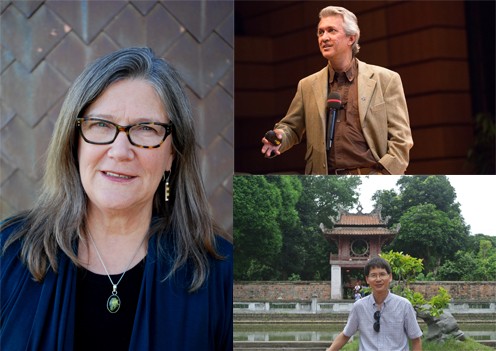Three UA professors with passions for creative writing, algebraic mathematics and hydrologic modeling have been awarded the highest faculty rank in the state–the title of Regents’ Professor.
Alison Hawthorne Deming, a creative writing professor, writes both poetry and nonfiction when she’s not teaching students. She said she loves teaching at UA because of the wide range of students she has the opportunity to exchange ideas with and meet in the classroom. As a professor, she feels satisfaction out of helping students share their own personal stories, especially of those who have not had an easy route to college.
“I get to see Arizona and Tucson through their eyes,” Deming said.
While now in her twenty-seventh year at the UA, she said being named a Regents’ Professor is a great honor, but she does her work as a professor because it has meaning, not because she has an expectation of being recognized for awards. She said the appointment is an instance she has felt most accomplished in her academic career.
A daughter of two parents who were also writers, literature was a part of Deming’s life since the beginning. She said the road to successful writing is not a smooth one though, and it takes years of writing mediocre material “to become a halfway-decent writer.” The love for reading and writing was always there, but the discipline necessary for the craft developed later.
The road to award-winning essays and articles, many with an emphasis in science, was also made bumpier by a pregnancy during her freshman year of college, Deming said, temporarily halting her educational timeline.
“I have had a very nontraditional path,” Deming said, “so women who make what they think might be detours early in their academic life should not be afraid. There’s a lot of time to do all that you want to do in life.”
She said she wants students to know they will be happier if they follow a career they love, rather than choosing one for practical reasons.
“There isn’t a clear path for how you will solve the problem of making a living if you have artistic aspirations, but that’s part of living a creative life,” Deming said.
RELATED: UA honors employees at annual Awards for Excellence ceremony
Pham Huu Tiep has been ardent about mathematics since he started learning it as a child growing up in Vietnam. He said the opportunity to train young people while also continuing his own research makes UA the perfect environment to be a professor.
The most challenging aspect of teaching so far is to find ways to keep students and colleagues engaged during lectures and to help them understand they should want to learn the curriculum for reasons other than just passing the next test or receiving excelling grades, according to Tiep. He said he wants students to want to learn because it will ultimately help them later on in their chosen career paths.
He hopes to show students mastering math is not only useful and obtainable, but even enjoyable at times. Tiep said if his students learned something useful after every lecture, he feels rewarded.
He said he also feels this way when he receives positive feedback from students or when students actually teach him new ideas. It is also gratifying for Tiep when former students become faculty members themselves.
He said becoming a Regents’ Professor is one of the greatest honors he can think of and he is happy with his current path of teaching while furthering his own research. His research focuses on algebra and the symmetries of various structures, a study applicable to many different areas such as engineering and physics.
A professor in the Hydrology and Water Resources department, Hoshin Gupta said he has focused on using computer models to learn and practice science so far in his academic career.
Like Tiep, Gupta said one of the most challenging obstacles as a professor is getting other people interested enough in content to want to learn it for themselves. He is a part of the Faculty Learning Communities on campus aiming to encourage students to aspire for higher success than just the 60 or 70 percent grade to pass the class.
“In some subjects–let’s say you’re designing a bridge or building or something, which I don’t do–you can’t afford for the person to be only 60 percent right,” Gupta said. “They have to be 100 percent right or else people die. So how do we get students to be motivated enough to not settle for anything less than 100 percent? That’s the hard part.”
Gupta said engagement with students is rewarding, but having a student challenge him and explain why he or she thinks he might be wrong is even more rewarding.
“Honestly if you’re not interested in learning, then you shouldn’t be teaching,” Gupta said.
Gupta said the Regents’ Professor title is motivating for him; he plans to explore more research on information theory and how to best process and represent information in models in the near future.
He said when students enter the university setting, the perceived unbalanced power dynamic between students and professors often lead students to want to be told everything and given clear instructions for everything.
“But what I’ve found is when a student is willing to listen–that at the same time, they’re much more interested in the discovery process and figuring out for themselves what they want to do their research on–the most interesting and exciting things happen,” Gupta said. “I’d want students to realize that they actually have the ability to at least be an equal partner in that conversation.”
Follow Jessica Suriano on Twitter.









